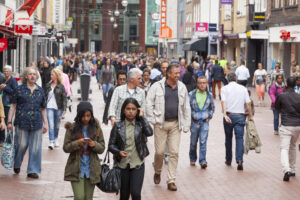
Almost half of shoppers plan to rein in their Christmas spending this year, with a sharp jump in the proportion of people worried about the impact on their finances, new research has found.
The proportion of those concerned about Christmas spending has risen by 15 percentage points in a year to 47 per cent, according to the survey. The Kantar consultancy polled 1,249 people over the age of 16 between October 18 and October 20.
One in three shoppers plan to cut their spending on gifts by £25 per person as double-digit inflation erodes their spending power.
The proportion of those leaving their shopping to the last minute has more than doubled, from 4 per cent in 2020 to 7 per cent this year as households struggle with their finances. More than a third, or 37 per cent, said they were struggling to manage their money.
A separate poll of consumers and retailers conducted this summer by Ankorstore, the marketplace for wholesalers, found that 41 per cent of shoppers plan to buy fewer gifts this year and that 6 per cent do not plan to buy any at all.
However, the majority of the 2,200 respondents to the survey in August said it was important to support local high streets this Christmas. Mary Portas, the retail expert and broadcaster, said: “People know how critical it is to shop local. Independent retail has been through the wringer in recent years but most of us know we’ve got to do our bit to support it.”
She said that a thriving retail sector “helps us all,” adding: “Busy local high streets provide community and connection. Online retail provides employment, inspiration and a whole heap of products that you don’t get with brands with a thousand stores. Let’s spend our money wisely this Christmas.”
Businesses are suffering from rising costs and weakening global demand while consumers are struggling to manage their finances amid rampant inflation and rising borrowing costs.
Experts have predicted that households will this year experience the biggest hit to their real incomes since the 1950s, which will lead to a fall in spending on goods and services.
This downturn in spending, alongside higher borrowing costs and weaker global demand, is expected to push the economy into a recession, which is defined as two consecutive quarters of negative growth, this winter.
Read more:
Half of UK shoppers to cut back on spending for Christmas gifts





